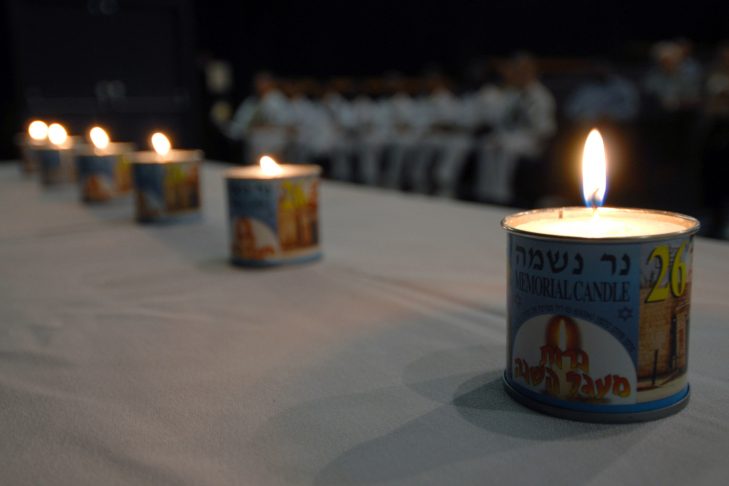April 2020 has been a month of a roaring pandemic as well as searing memories of the Holocaust. Particular to the month has been the 75th anniversary of the liberation of the Bergen-Belsen and Auschwitz death camps, and the 77th anniversary of the Warsaw Ghetto uprising.
Public commemorations of these anniversaries and more have been broadcast on the internet. At the Jewish Community Relations Council of Greater Boston (JCRC) virtual Yom HaShoah remembrance on Sunday, Gov. Charlie Baker delivered remarks, as did Rabbi Marc Baker, president and CEO of CJP.
“As communities around the world commemorate Yom HaShoah,” Baker said, “we will honor the memories of those lost in the recalling of this horrific chapter of our Jewish and human history. We will also tell the stories of those who survived. Reminding ourselves that in the face of anyone or anything that tries to destroy us, the resilience of the human spirit and the Jewish people will overcome.”
April has also been designated as Genocide Awareness and Prevention Month, and Rachael Cerrotti, a third-generation Holocaust survivor and storyteller, has rolled out a new project for the occasion. Over the past decade, Cerrotti’s story has been entwined with her grandmother Hana’s story of survival during World War II. The only survivor of the Holocaust in her family, Hana was sent to Denmark by her parents at the beginning of the Holocaust. After the Nazis invaded Denmark, Hana made her way to Sweden and eventually settled in the United States.
Cerrotti’s project to tell her grandmother’s story culminated in a popular podcast produced in conjunction with USC Shoah Foundation called “We Share the Same Sky.” Founded by Steven Spielberg, the foundation houses over 100,000 hours of audio and visual testimonies of Holocaust survivors. Hana was interviewed for the project in 1998.
Cerrotti’s new undertaking is called “What Is Home Project.” Working again with USC Shoah Foundation, Cerrotti is collecting stories from survivors on the theme of home. She recently told JewishBoston: “Home is the heart of every survivor’s story. You flee your home—your home isn’t a space anymore. You also dream of home and the memory of home. You recreate your home. It’s this feeling of how do we get back that place, or will it ever come back? And yet here we are, being told to sit at home. It causes us to understand that home is not as simple as one thinks.”
Cerrotti has put out a call on social media for people to tell their stories of home “from this emotionally complex space [of the pandemic], and we’re encouraging people to do it in all types of forms, including poetry, photography or audio clips. Home can be a space in your head, a memory or a smell. It can also be very literal.”
In addition to presenting stories of survival throughout the Holocaust and beyond, Cerrotti is also curating a collection of tales of living during the pandemic. She envisions that within two generations, children will hear from grandparents about what it was like to live through the COVID-19 pandemic. “My goal is to get people to think about the power of intergenerational storytelling and to understand that we just don’t consume history, we create history,” she said. “To guide people in telling these stories, we have a different theme every week. Last week was ‘Spaces and Places.’ ‘Family’ is our topic for the week of April 20, and the following weeks we’re looking for stories that touch on ‘Resilience’ and ‘Messages for the Future.’”
I thought about the themes attached to Cerrotti’s project as I attended virtual broadcasts of Yom HaShoah events and listened to George Takei’s story in a Facing History and Ourselves webinar called “Standing Up to Racism, Then and Now.” Known for his role in the original “Star Trek” television series, Takei is a Japanese American who was interned with his family in “10 of the most desolate places in the United States” during World War II.
As it happens, April is also the 78th anniversary of the internment of Japanese Americans. “When I was 5 years old,” Takei said in his talk, I was categorized as an enemy alien in my own country.” Takei was born in Los Angeles and his mother was born in Sacramento, California. His father was brought by his parents from Japan to San Francisco when he was a young child.
Takei recalled that his family—his parents and two siblings—were ordered out of their Los Angeles home at gunpoint. “Because we looked like the people who bombed Pearl Harbor, we were seen as the enemy and alien,” he said. “War hysteria swept across the country, combined with racism. We were at war with Germany and Italy, but Italian Americans and German Americans looked like the rest of America. We looked different.”
Amazingly, Takei is not bitter. He credited his father with instilling in him a deep love for the United States. “I learned about American democracy from the man who suffered the most, who felt the pain of the failure of democracy the most but who firmly believed in the core ideals of our democracy,” he said.
Later in the week, I listened to Esther Ringel, a survivor of Theresienstadt and Auschwitz, tell her powerful story. Ringel, who was a child when she was deported, recalled how she was alone after the selection of prisoners at Auschwitz. It was the last time she saw her mother and brother. She said she owed her survival to a young woman named Eva, who shepherded Ringel to her liberation by the Russians. Ringel referred to her as an “angel.” Now in her 90s, Ringel lives in Israel and is the matriarch of a large and thriving family. She and Eva remain close.
Baker asked the JCRC Yom HaShoah attendees to bear in mind that the signature story of Jewish nationhood and survival is the Exodus from Egypt. The Israelites endured 430 years of slavery under a succession of cruel pharaohs before they fled Egypt under threat of death. Jews have been commanded to relive this story in word and deed through the millennia.
To that end, Baker recalled something he recently heard at a virtual seder: “The retelling of the Passover story is as close as we can get to the genetic transfer of hope.” And, as it turns out, this week was an embodiment of that sentiment.








